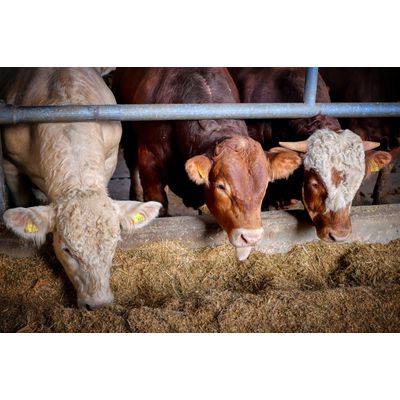

- Home
- Companies
- Beston Group Co., Ltd.
- Articles
- Application of Biochar in Animal ...

Application of Biochar in Animal husbandry: Feed Additive
Animal husbandry plays a crucial role in meeting the global demand for animal products. However, it also generates significant environmental challenges, such as nutrient runoff and greenhouse gas emissions. To address these issues, researchers and farmers have been exploring innovative solutions, and one such solution is the application of biochar as a feed additive. This article will delve into the potential benefits of using biochar in livestock farming, focusing on its role as a feed additive. The discussion will be organized into three main sections: the impact of biochar on animal health, its effects on feed efficiency, and its environmental benefits in livestock production.
I. Impact of Biochar on Animal Health
A. Improved Digestive Health
- Enhanced gut microbial activity: Studies have shown that incorporating biochar into animal feed can stimulate the growth of beneficial gut bacteria, leading to improved digestion and nutrient absorption.
- Reduction of pathogenic bacteria: Biochar has been found to possess antimicrobial properties, effectively reducing the population of harmful bacteria in the animal's digestive system, thereby promoting overall digestive health.
B. Enhanced Immune Function
- Increased antibody production: Research suggests that biochar supplementation in animal feed can stimulate the immune system, leading to increased production of antibodies and improved resistance to diseases.
- Enhanced resistance to diseases: Biochar's ability to modulate the immune system can help animals better combat various pathogens, resulting in reduced disease incidence and improved overall health.
C. Reduction of Mycotoxin Effects
- Adsorption properties of biochar: Biochar produced by biochar production equipment has a high adsorption capacity, making it effective in binding mycotoxins commonly found in feed ingredients. By reducing mycotoxin exposure, biochar helps improve feed safety and animal performance.
- Improved feed safety and animal performance: By mitigating the negative effects of mycotoxins, biochar supplementation in feed can lead to improved animal growth, reduced health issues, and enhanced productivity.
II. Effects of Biochar on Feed Efficiency
A. Nutrient Retention and Utilization
- Increased nutrient absorption: Biochar has a porous structure that provides a large surface area for nutrient adsorption. This property enables better nutrient retention and absorption in the animal's digestive system, leading to improved feed efficiency.
- Enhanced growth and weight gain: Studies have demonstrated that animals fed with biochar-supplemented feed exhibit enhanced growth rates and improved weight gain compared to those on conventional feed.
B. Alleviation of Heat Stress
- Improved thermal regulation: Biochar has the ability to absorb and dissipate heat, which can help alleviate heat stress in animals during hot weather conditions. This thermal regulation contributes to maintaining optimal body temperature and reducing the negative effects of heat stress on animal performance.
- Increased feed intake during hot periods: Heat stress often leads to reduced feed intake, resulting in decreased productivity. By reducing heat stress, biochar supplementation can help maintain feed consumption levels, ensuring adequate nutrition and promoting better feed efficiency.
C. Reduced Feed Conversion Ratio
- Enhanced efficiency of feed utilization: Biochar's ability to improve nutrient absorption and utilization ultimately leads to a reduced feed conversion ratio. Animals fed with biochar-supplemented feed require less feed to produce a unit of weight gain, resulting in cost savings for farmers.
- Cost savings for farmers: By improving feed efficiency and reducing the amount of feed needed, biochar supplementation can have a positive economic impact on livestock farming operations.
III. Environmental Benefits in Livestock Production
A. Nutrient Management
- Reduced nutrient runoff and leaching: Biochar has been shown to adsorb nutrients, preventing their loss through runoff and leaching. This property helps reduce nutrient pollution in water bodies and enhances nutrient cycling within the farming system.
- Increased soil fertility and nutrient cycling: The addition of biochar to the soil in livestock farming systems enhances soil fertility by improving nutrient retention and availability. This, in turn, promotes sustainable nutrient cycling and reduces the need for external fertilizers.
B. Carbon Sequestration
- Biochar's stable carbon structure: Biochar is produced through the pyrolysis of biomass, which results in a stable carbon structure resistant to decomposition. By incorporating biochar into the soil, carbon can be stored for an extended period, contributing to carbon sequestration and mitigating greenhouse gas emissions.
- Mitigating greenhouse gas emissions: The use of biochar in livestock farming systems has the potential to reduce greenhouse gas emissions by sequestering carbon and reducing methane and nitrous oxide emissions from manure and fertilizers.
C. Odor Control
- Adsorption of volatile compounds: Biochar has adsorption properties that can capture and reduce the release of volatile compounds responsible for unpleasant odors in livestock facilities. This leads to improved air quality and a more favorable working environment for both animals and farm workers.
- Improved air quality in livestock facilities: By mitigating odor emissions, biochar supplementation contributes to the reduction of environmental nuisances associated with livestock farming, benefiting both the farm and surrounding communities.
Ⅳ.Case Study: Biochar in Ox Farming
A. Increased Weight Gain and Feed Efficiency
- Study on the effects of biochar on ox performance: A study conducted on ox farming demonstrated that the inclusion of biochar in ox feed led to increased weight gain and improved feed conversion efficiency.
- Improved growth rate and feed conversion ratio: The oxen fed with biochar-supplemented feed exhibited a higher growth rate and lower feed conversion ratio compared to the control group, indicating the positive impact of biochar on ox performance.
B. Enhanced Digestive Health and Reduced Digestive Disorders
- Biochar's impact on rumen health: Research findings suggest that biochar supplementation in ox feed can positively influence the rumen microbial population, leading to improved digestive health and a reduction in digestive disorders.
- Reduction in digestive disorders: The inclusion of biochar in ox feed has shown to alleviate digestive disorders, such as acidosis and bloat, resulting in better overall health and performance of the animals.
C. Environmental Benefits
- Nutrient management and soil fertility: By incorporating biochar into the manure management system, nutrients are better retained and recycled. This not only improves soil fertility but also reduces the risk of nutrient runoff and water pollution.
- Greenhouse gas emissions reduction: The use of biochar in ox farming can help mitigate greenhouse gas emissions by sequestering carbon in the soil and reducing methane emissions from manure. This contributes to the overall sustainability of the farming operation.
Conclusion:
Biochar has emerged as a promising feed additive in livestock farming due to its potential to enhance animal health, improve feed efficiency, and provide environmental benefits. Its positive impact on digestive health, immune function, and mycotoxin reduction contribute to overall animal well-being. Moreover, the improved nutrient retention and utilization, heat stress alleviation, and reduced feed conversion ratio lead to better feed efficiency and economic gains for farmers. Additionally, biochar's environmental benefits, such as nutrient management, carbon sequestration, and odor control, make it an attractive option for sustainable livestock production. As the demand for animal products continues to rise, investing in biochar production equipment may prove beneficial for both livestock farmers and biochar fertilizer manufacturers, paving the way towards a more sustainable future in the livestock industry.
